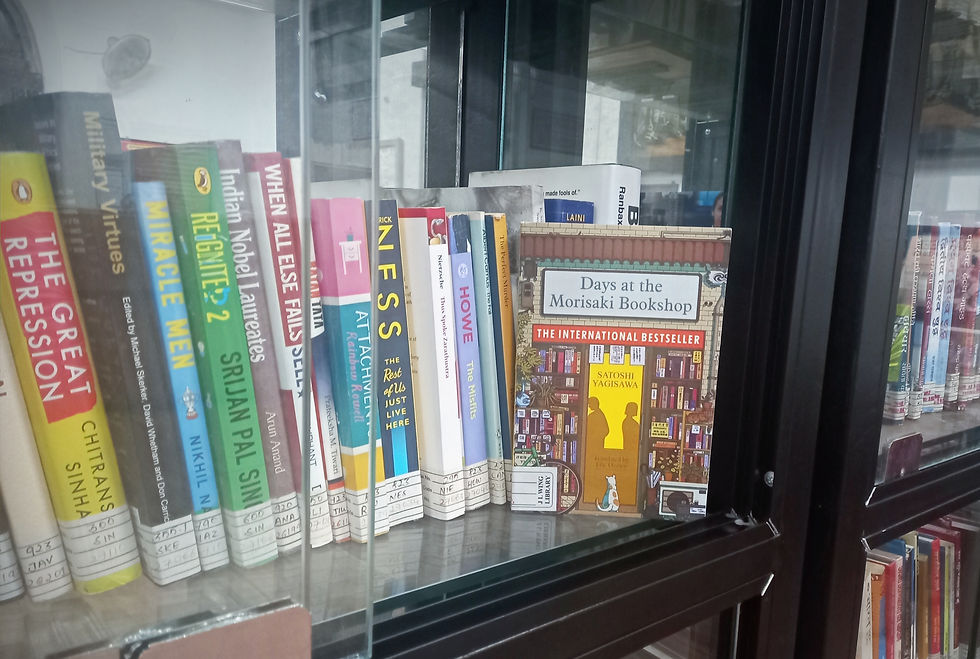Days at the Morisaki Bookshop by Satoshi Yagisawa
- Ninay Desai
- Aug 22, 2025
- 3 min read
Updated: Sep 12, 2025
I picked up Days at the Morisaki Bookshop expecting a cosy read about small joys and the life-affirming pleasures of forging human connections in a fast-moving world. Sadly, that was not to be. What I got instead was a book that devolved into a corny Hallmark movie with conflicts that practically resolve themselves and characters who are barely even one-dimensional.

Satoshi Yagisawa’s debut novel, Days at the Morisaki Bookshop is about a heartbroken 25-year-old woman, Takako who ends her relationship with her boyfriend because he was coolly two-timing her with a colleague. Given that they all work in the same office, Takako finds staying on at her job untenable and hands in her resignation.
Depressed, alone and unemployed, she spends her time mostly sleeping in her rented Tokyo apartment. After a month of hibernating like a miserable bear, Takako receives a voicemail from her uncle, Satoru, who runs the Morisaki bookshop which sells second-hand books. He offers her free lodging in the room above the shop in exchange for opening up and manning the bookshop in the mornings. That gets the ball rolling.
The protagonist, Takako is not much of a reader but starts reading out of boredom, finding solace in second-hand books. Her uncle, Satoru introduces her to the neighbourhood of Jimbocho—home to the largest number of second-hand bookshops in Tokyo. So far, so good.
However, if you were looking for a relatable protagonist, it’s best to stop looking. Takako is bland and uninteresting and remains so right upto the last page. In fact, all the characters in this book, including Satoru and his estranged wife are underwritten with conflicts so half-baked they’re indigestible.
The subplot about the relationship between Satoru and his wife and why she left him takes up almost half the book and yet has such a tepid and incomplete resolution that I was left wondering if I had missed a couple of pages. I hadn’t.
For me, Days at the Morisaki Bookshop read like a not-too-good Young Adult novel even though it isn’t. For a story with a narrator who is at least 28 years old when she begins narrating the story and has been through some life changes, her expression and perspective lack maturity. Add to this, writing that is sorely lacking in specificity, and there’s very little left to enjoy.
However, there are some genuinely relatable portions that I would’ve liked more of, like these lines about the special joy of reading second-hand books.
“At some point in the past, someone reading this book had felt moved to take a pen and draw a line under these words. It made me happy to think that because I had been moved by that same passage too, I was now connected to the stranger. Another time, I happened to find a pressed flower someone had left as a bookmark. As I inhaled the scent of the long-ago-faded flower, I wondered about the person who had put it there. Who in the world was she? When did she live? What was she feeling? It’s only in secondhand books that you can savour encounters like this, connections that transcend time.”
Sadly, the theme of the refuge that books provide is not explored enough. Neither are the concepts of urban loneliness or the importance of choosing one’s own path in life really allowed to develop and add depth to the story. As a result, Days at the Morisaki Bookshop ends up being an underwhelming read.



Read this book and was quite disappointed. I believe this is quite a popular book. I wonder why. I found the writing amateurish and the plot very loose.